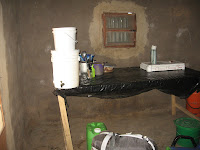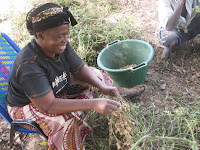Doing my baseline survey, I get to meet a bunch of interesting people around the town of Dombilia. One girl, strikingly pretty and energitic, was particularly interested in talking to me and I returned a few days later to play the guitar with her family, talk and hang out. Her name is Sugaglo, she is around my age, and she called me toward her hanger in the market on market day to drink tea with her friends. After chit-chatting, I spotted Irene’s bold eyes as she motioned for me to come by her side.
“Aminata,” she says, being extra careful to pronounce a simple, simple Bambara so that there would be no misunderstanding, “Do not drink tea with just everyone. You can drink tea and the health center, or with your host family. Only. Nowhere else- do you understand?”
I suppose she’s right, but since coming to Dombilia, I’ve never really been concerned about safety. Yet for some reason, seeing me drink tea with my friend was alarming to Irene.
The next night, I was out in my cornfield sweet-spot- the only place I get cell phone reception in town. As always, a group of kids comes swarming by, wanting to know who I am talking to. I dismissed them, only to see that amongst them was Sugaglo. She had come over to talk to me and I had told her crowd to leave me be. Apologetic and embarrassed, we talked for awhile and I walked her a bit down the road (which is customary when a friend is leaving).
Feeling bad for not being around to talk with Sugaglo, I was surpised to return to my compound to an angry host family and a group of angry neighbors.
“Aminata! Where were you?”
“On the phone?”
“Sungaglo came over and wanted you to chat. Were you going over to her house?”
“No, she had come here to talk.”
”Do not go over there, do you hear?”
What followed was the first time I had really felt discordance among the villagers in Dombilia. My trio of little runner boys- Shaka, Mahamadu, and Cesalo are always very possessive of me and get angry when I hang out with other people. But here was some true resentment. She is a prostitute. She has AIDS. She has many men. She is sick and you shouldn’t be going over there at night.
I explained I was not planning on going across town at night, I know better than that. But she befriened me and I enjoy talking to her. The adults agreed it was fine to chat during the day in the market. But do not take her tea (apparently they are afraid she puts drugs in it… seemed fine with me but I’ll stop anyway) and do not go over at night. They must have repeated these things a million times, and couldn’t say “I understand" enough.
A few days later, I paid a visit to Sungaglo again. Yes, she is my friend. And if it is true that she has AIDS and that the villagers resent her, even better to start a positive relationship with her, so maybe one day, I could help start to ease some of the tension. We went out and picked sweet potatoes in her field, and she sent me home with enough to feed me for a month. Not on the road for two minutes, I saw my trio of side-kicks- Shaka, Mahamadu, and Cesalo, questioning me like parents to a teenager that just got caught from sneeking out at night.
“Where were you?”
“The field”
“WHO’S field”
“My friend Sungaglo.”
“She is not your friend. We told you not to speak to her again.”
I gave them the lecture that I keep having to repeat. Be kind to everyone. Yes, I am going to greet everyone. Yes, everyone in Dombila is my friend. No, I won’t wander around at night, but I am going to chat with everyone. Thinking they were only being stubborn and possessive I dismissed the “Aminata, you’re bad” “Yeah, you’re bad” “We’re mad at you” and went back home. That night, as I was talking on my phone in my sweet spot, little Mohamadu finds me again. Eight years old, he sometimes calls to me in my window at night, asking for bubblegum or peanuts (which always freaks me out hearing this little child whisper to me at night). But tonight, he is upset. Really upset.
“Aminata, you’re bad” I think he is going to follow up with a complaint about me not giving him peanuts or something, but when I ask him what is the matter, he refuses to tell me. Finally, he brings his chin up, and I look into his eyes watering up. “Aminata, if a stranger gives you candy, don’t take it. If a stranger gives you tea, don’t take it. Some people are bad people.”
This just ripped my heart open. The ‘don’t take candy from strangers’ talk from an eight-year-old in the middle of Africa. I have always felt safe in Dombilia, always. Even when my language tutor tells me that there are very resentful and bad-intented people, if they want express their hatred toward somebody, they go to a witch doctor and do an offering to an evil spirit. To a Malian, this is serious stuff, but as for me, I’m not worried about anyone seriously hurting me. Accepting me and respecting me perhaps, but I am in good hands here. It’s not my safety I am worried about, it is the dynamics of this community. Underneath the surface, there is gossip, there are old rivalries, and there are indeed untouchables. Like any community I suppose. So where do I fit into this picture? How can I call myself a volunteer for peace if I turn my head when the wrong people greet me? So I’ll greet Sungaglo, I’ll visit her from time to time and sing with her family and the children of her compound. I may even go help her in her sweet potato field… in daylight. And just in case, I’ll pass on the tea.
















